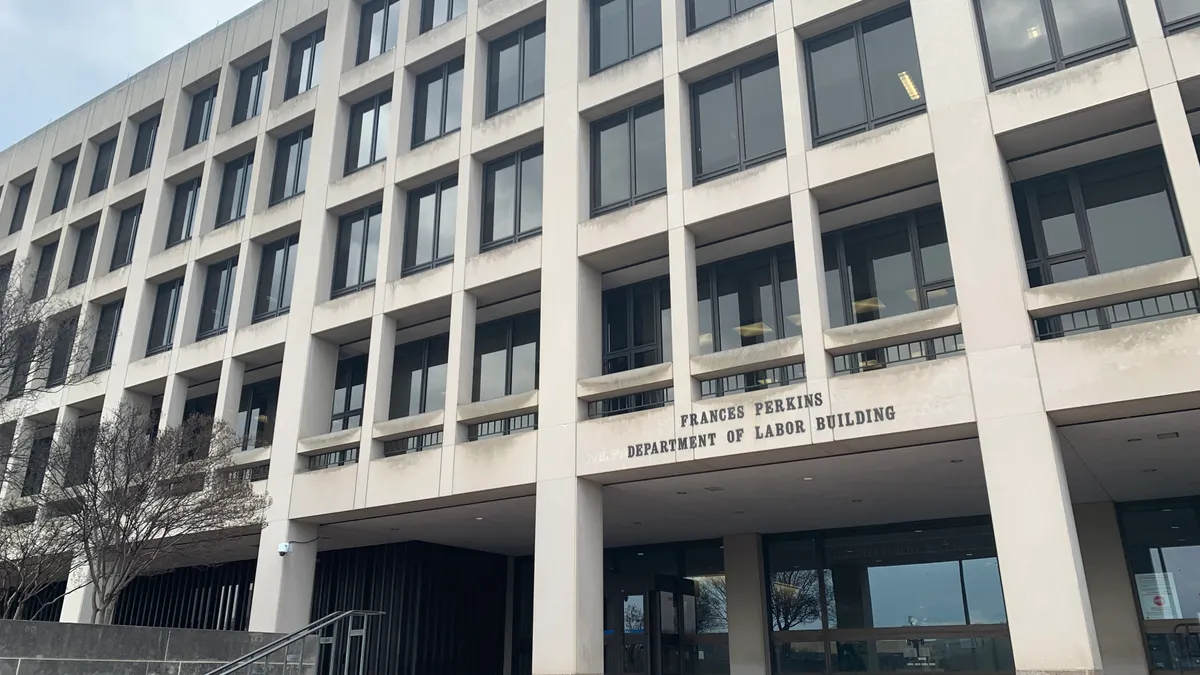Congressional lawmakers failed to avert a federal government shutdown Tuesday night, despite the Republican majority’s efforts to put forth a short-term spending measure to fund the government through late November, the Associated Press reported.
HR professionals who have been part of the industry through the last several presidential administrations may be familiar with the disruptions caused by shutdowns. The most recent shutdown, which began in December 2018 during President Donald Trump’s first administration, lasted five weeks and resulted in roughly $3 billion in lost gross domestic product, according to a Congressional Budget Office analysis.
Below, HR Dive has provided a recap of the relevant employment-related federal agency activities set to be interrupted as well as comments from industry leaders on broader effects.
Several immigration procedures paused — including E-Verify
The U.S. Citizenship and Immigration Services is a fee-funded agency, meaning employers should not see disruptions to USCIS filings for nonimmigrant or immigrant visas, attorneys at Littler Mendelson wrote in a blog post Monday. However, the U.S. Department of Labor has said it will not process foreign labor certification applications during a shutdown. Because LCAs are required for nonimmigrant visas, employers could be prevented or delayed from making such filings.
Additionally, the Department of Homeland Security’s E-Verify program is expected to be “completely unavailable,” Littler attorneys said, meaning employers would not be able to access their accounts, run reports, enroll in E-Verify or view or act on cases within the program.
But employers must still complete Form I-9s for new workers and comply with all Form I-9 requirements during the shutdown. “Once the E-Verify system is again functional at the end of the shutdown, we advise that employers process the E-Verify inquiry on the employees who were subject to the shutdown freeze period,” Littler’s attorneys said.
By contrast, DHS has said that several other functions will continue during the shutdown, such as law enforcement operations and certain port-of-entry functions. Most U.S. Immigration and Customs Enforcement personnel are expected to continue working through the shutdown.
EEOC disruptions affect litigation, charge processing
The U.S. Equal Employment Opportunity Commission’s lapsed appropriations contingency plan states that staff will not be available to answer questions from the public or respond to associated correspondence.
“Pursuant to the plan, only activities involving the safety of human life or the protection of property and those activities required by statute will continue,” according to the document.
While EEOC will accept charges as well as internal federal sector complaints, it will not investigate those charges and complaints. The agency also will cancel mediations and pause litigation in federal courts where a court has granted a request for a stay of proceedings or an extension of time.
However, the agency will continue to docket new private sector charges and litigate lawsuits in which a court has not granted continuance. Staff also will examine new charges to determine whether prompt judicial action is necessary to protect life and property and file to obtain preliminary relief where appropriate.
A lack of investigations on charges filed during the shutdown is likely to create monthslong backlogs, attorneys at Fisher Phillips wrote in a Wednesday blog post.
A scant situation at DOL’s Wage and Hour Division
The U.S. Department of Labor said in its contingency plan document that only 10 of the 1,270 full-time employees in its Wage and Hour Division will work during the shutdown. The agency noted that all regulatory work would cease, while enforcement activities would be limited only to those involving emergencies related to the safety of human life or protection of property.
“During recent government shutdowns, ongoing investigations essentially were stopped in their tracks,” the Fisher Phillips attorneys said. “We expect this shutdown to look very similar in nature, so prepare for wage and hour investigations and compliance actions to be put on ice for the duration of the shutdown.”
Ongoing litigation is expected to continue in the meantime, however, though this too could be affected by limited judiciary funding in the event of a prolonged shutdown, the Fisher Phillips attorneys added.
NLRB’s quorumless conundrum adds wrinkles
The National Labor Relations Board lacked a quorum for several months prior to the shutdown. Now, the lapse in federal funding means much of the agency’s day-to-day work is also likely to grind to halt, Fisher Phillips’ attorneys said.
Affected operations include handling of cases before the Board, union elections and unfair labor practice investigations. Fisher Phillips noted that in past shutdowns, NLRB granted automatic extensions to parties required to file documents with the agency in ongoing cases and that a similar measure is expected to be put in place following the current shutdown.
As with EEOC and discrimination charges, NLRB is likely to accumulate a backlog of union petitions during the shutdown, Fisher Phillips’ attorneys added. That may mean employers that file or receive such petitions receive a head start to respond — but employers shouldn’t delay acting upon a petition during that time, the attorneys said.
SHRM exec: HR departments face ‘avoidable disruption’
Meanwhile, the Trump administration could conduct further reductions in force during the shutdown, a prospect that has worried federal employees as well as contractors. Unions representing federal workers on Tuesday filed a lawsuit in the U.S. District Court for the Northern District of California seeking to preliminarily enjoin the White House from implementing such reductions.
Outside of the federal workforce, even a brief shutdown could disrupt daily operations for an estimated 25% of organizations and put 23% of annual financial goals at risk, Emily Dickens, chief of staff and head of government affairs at SHRM, said in a press release Tuesday. The share of affected employers would grow if the shutdown persists for a week or longer.
HR departments specifically will need to manage furloughs, process payroll changes and address employee anxiety under tight timelines, among other challenges, she added.
“SHRM calls on Congress and the Trump Administration to work together to reach an agreement and avert a shutdown,” Dickens said. “Workers, families, employers, and the HR professionals who support them deserve stability and certainty, not avoidable disruption.”
























